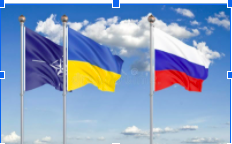Enemy at the Gates: The Russian ‘Big Brother’ and the NATO-Ukraine Conundrum
Posted on : February 7, 2022Author : Raunak Bhattacharya

The Second World War happened to be a cataclysmic event in Western political history. It spearheaded the development of a new era of bipolar competition, with the USA and the USSR finding themselves embroiled in a situation of extreme unease and constant fear of unmitigated conflict that would ultimately lead to catastrophe by a nuclear apocalypse. The elements of fear and threat happened to be of great epistemological and ontological significance; if there is an endeavour to assuage the degree of fear on a qualitative basis, then the quantitative measure of the weapons hoarded- both conventional and unconventional, shall suffice. The presence of a Doomsday Clock, predicting a nuclear winter, happens to be a sordid eschatological spectacle of how doom and demise happened to be a constant reminder, as capitalism happened to proliferate, adapt its forms to the burgeoning needs of the times, and shaping neoliberalism; the everlasting threat of annihilation only rescinded following a significant passage of time.
The Cold War, at its very outset, had been very distinct with the feature of animus dominandi. The ideological rift between liberalism and socialism brought along with it, ‘Bloc Politics’. Bloc Politics does not happen to be anything novel in the scope of conventional warfare. A longue durée approach of the same would reveal its existence, often beyond the scopes of temporal and spatial delineations, significantly and poignantly indicating the existence of a certain ‘common sense’ understanding of rationality. In fact, if one takes the particular appositeness of alliances into cognizance, then it goes without say that qualitative assessment of alliances is in fact a very banal propensity.
Thucydides’ discourse enshrined in his masterly work, ‘The History of the Peloponnesian War’, drives home the particularly interesting concept of the ‘Thucydides’ Trap’, something that has been complicated and has been very well illustrated in the works of Graham Allison. Allison, in his work, ‘Destined for War: Can America and China escape the Thucydides’ Trap?’, provides a poignant commentary with deep academic brevity and acumen, vis-à-vis the US-China competition, wherein the former having enjoyed a complete unipolar status, since the end of the Cold War, suddenly finds itself facing a challenge from a burgeoning, irredentist and revisionary power in the form of China. Unlike this competition, that many, in its state of infancy, considered to be never possible, in fact, a ‘Black Swan’, a term that has been defined by Nassim Taleb, as ‘an event, that seems to us, on the basis of our limited experience, to be impossible’. This triumphalist stance of the United States, following the end of the Cold War, has also been pointed out and subjected to severe criticism by Kishore Mahbubani, the veteran International Relations Scholar and Singaporean diplomat. In fact, this sense of triumphalism has indeed pushed the US away from its unipolar moment unto a state of hubris, that ultimately leads to pathos.
The end of the Cold War commences with the fall of the Berlin Wall and the subsequent break-up of the Union of the Soviet Socialist Republics, with the onus and strength falling upon Russia that happened to be the largest, most populous and materially superior compared to its counterparts. The essay began with an endeavour to point out the pertinent presence of Bloc Politics. In contemporary times, as the Russo-Ukrainian predicament seems to proliferate, it becomes significant to mention about the North Atlantic Treaty Organization (NATO) formed in 1949 and the Warsaw Pact (Treaty of Friendship, Cooperation and Mutual Assistance), formalised in 1955; the former happens to be the US-led bloc and the latter includes the Soviet Union-led bloc, made up of mostly the Soviet Republics. It must be mentioned that following the end of the Cold War, the Warsaw Pact ceased to exist, however, the NATO continued to stay resilient in its bid to protect European sovereignty and severely influence the geopolitical situation in Europe. It was only natural that a large number of former Warsaw Pact members, especially Eastern European Nation-States that came forward in a bid for candidature to the exclusive club that guaranteed protection under the American umbrella. This is not exactly something that had been taken by the Russian Federation, as successor to the USSR, in a very positive light, thereby making conflict imminent. In fact, before Ukraine, it had been Georgia who has had to face the brunt from the Russian bear. It goes without say, that when the bear strikes, the damage dealt is too heavy. Georgia had to relent. Estonia, Latvia and Lithuania, joining the NATO further alarmed Moscow to the fact, that it was losing influence in its backyard. Moreover, the existent cultural dissensions, the Russians had with the three aforementioned nation-states, further added fuel to the fire. Thus, Russia’s reaction to Ukraine striving to join the NATO, is indeed natural, not a ‘Black Swan’, but a ‘Grey Rhino’, as the American author, Michele Wucker had mentioned.
However, what seems to interest this author, is to find escalations along Crimea and the Russo-Ukrainian border following the shifting American focus to the Indo-Pacific Maritime Region. The escalating tension along the European Region, at the backdrop of a shift in geopolitical emphasis, leads to the question as to who, the sole beneficiary of the same is. China, maintaining a steadfast silence with regards to the matter at hand, indicates the brevity of the situation. It goes without saying that the current perception that seems to dominate the narrative is that of Russian reluctance to accept its position as a mid-level power and at some point, exert its pan-Eurasian influence. It seems to be a bid to stay relevant and preserve its area of influence, while countering the idea of Europe.
Putin’s authoritarian trends are not exactly unbeknownst and require a lot of reiteration. The Federal Security Bureau (FSB), the successor to the Soviet era KGB (Soviet Secret Police), tasked with carrying out assassinations, as well as attacking public intellectuals who tend to oppose the iron-clad rule of Putin, is quite infamous. In the Ukraine crisis too, it must be understood that Russia intends the nation-state to undertake a process of ‘Finlandization’. The pro-EU Orange Movement served as the trigger for the Russian intervention. Victor Yanukovych, the erstwhile President did go ahead with this policy of appeasement, but the Ukrainian volonté générale outrightly rejected the same, providing Moscow the much-vaunted opportunity to intervene on behalf of the Russian speaking people inhabiting Ukraine. Before Kiev could be au fait with the situation, Moscow moved forward with its two-pronged attack. Putin’s fiery speeches and assertions, followed by his fiery address at the Duma, led to the 2014 Crimean Referendum, that cemented the fate of Crimea.
Ukraine’s position as a buffer between Europe and Russia has uniquely turned into a veritable hotspot. The geopolitical and geospatial significances of the same, can indeed serve as the perfect trigger for a third World War. The building up of troops on both camps, along with Biden’s credibility crisis following the US withdrawal from Afghanistan and the subsequent Taliban seizure of power therein, has placed the United States in a very complex and complicated situation, much like the Gordian knot (https://www.asiainglobalaffairs.in/dialogue/bidens-america-first-and-the-afghan-credibility-crisis/?fbclid=IwAR2OVD1cz9G48ilt-gyUFgHOxYpL-VZGQeqaR4tKpvKEkgTPKFAdv2YB2QU) , and creating an unnecessitated credibility crisis. Washington’s momentary lapse happens to denigrate its stance while keeping up dialogue with Moscow, and its position in NATO does not keep up with Russian gusto.
The Ukraine crisis happens to highlight the bane of multipolarity, as well as intensifying tensions in a Thucydides’ Trap. Putin’s erratic behaviour cannot simple be clubbed upon his oligarchic, authoritarian tendencies. It is pertinent to take cognizance of his Role conception and a historical and socio-cultural understanding of Russia; it goes without say, that deep in his psyche, he roots for a world order with Russia at the helm, but in terms of Realpolitik, he is well aware of his limits, vis-à-vis attainability. Putin’s statement at the Valdai Club in 2014 that the ‘bear shall be content with the entirety of the taiga’ does not seem to have cooled down, with time. Instead, with its coveted gas pipeline to Europe at threat, the angst has only seemed to proliferate. The Covid-19 pandemic has served its purpose as the perfect cover to step up his game.
Only time will tell if Russia emerges as the viable ‘balancing variable’ that China intends to employ in the dangerous game of wei qi that it is playing with the United States, whether or not, Putin shall serve as the impervious anarchic oligarch of history, who shall disrupt the flow of time and sow the seeds of doom, may seem imperviously delirious, but not entirely unviable. In these contemporary times, it is required to take greater cognizance of the conflict, as the muscle-flexing pertaining to the same, only seems to proliferate, rather than any real diplomatic dialogue. However, the ultimate hampering shall be faced by the Indo-Pacific Maritime Region discourse, as shifting American attention, helps China to further its course of preponderance, something that the latter shall do very subtly, based on its understanding of its Warring States’ Philosophy.
Raunak Bhattacharjee
The author has interned with Asia in Global Affairs





Leave a Reply